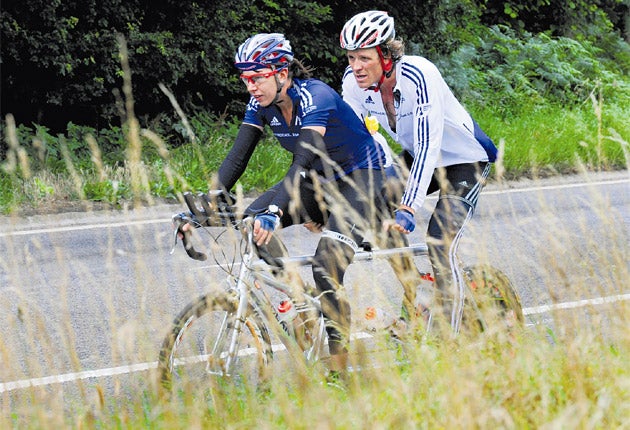Cycling: Olympic duo abandon record attempt
Injury ends Land's End to John O'Groats record bid of Cracknell and Romero

Your support helps us to tell the story
From reproductive rights to climate change to Big Tech, The Independent is on the ground when the story is developing. Whether it's investigating the financials of Elon Musk's pro-Trump PAC or producing our latest documentary, 'The A Word', which shines a light on the American women fighting for reproductive rights, we know how important it is to parse out the facts from the messaging.
At such a critical moment in US history, we need reporters on the ground. Your donation allows us to keep sending journalists to speak to both sides of the story.
The Independent is trusted by Americans across the entire political spectrum. And unlike many other quality news outlets, we choose not to lock Americans out of our reporting and analysis with paywalls. We believe quality journalism should be available to everyone, paid for by those who can afford it.
Your support makes all the difference.Four years ago he took part in a rowing race across the Atlantic Ocean in a two-man boat, only to be beaten into second place on a technicality. Earlier this year he trekked to the South Pole, but was pipped to the finish line by a team of Norwegians almost a century after Roald Amundsen claimed a similar victory over Captain Scott.
Yesterday, another of James Cracknell's Herculean adventures ended in disappointment, after his cycling partner, Rebecca Romero, was forced to pull out of their Land's End to John O'Groats world record attempt, citing knee trouble.
The pair, who are both Olympic gold medallists, had hoped to become the fastest mixed-sex duo to cycle the length of Britain on a tandem bicycle.
But at 9.41am yesterday morning, just north of the small Scottish village of Johnstonebridge, their dream came to a premature end. Romero, 29, who won a cycling gold medal in Beijing last year, began feeling "discomfort" in her knees and was advised to withdraw by the challenge's organisers.
"It was a difficult decision to make because of the commitment she'd put in, but in the long run it's the right decision," said Bentley Waller, the team doctor.
An exhausted Romero said that while she hated giving in, she did not want to risk pushing herself too hard in case she caused long-term damage to her knee and jeopardised her cycling career. She intends to participate in the 2012 Olympics in London.
She said: "I'm gutted. I'd been doing some preventive physio work because of some tightness and discomfort in my knees, but it was decided the volume of work was too much, and there was no time to recover... and my knees are part of my day job. I'm really disappointed. Before today I didn't have any pain, and I really wanted to succeed. It's such a shame, but these things happen."
Cracknell, 37, who won rowing gold medals at two Olympic Games, added: "She's hugely devastated. It was frustrating, it wasn't easy. Telling her [it was over] was a job no one wanted, but it had to be done."
The pair had set off from Land's End at 5am on Monday, and had completed more than 500 miles of the 874-mile trip in just 29 hours before Romero's injury made it impossible to continue. They had been on course to beat the current record by three hours. To succeed they would have had to travel at just under 16.5mph, and yesterday they were averaging speeds of 18.5mph. Most cyclists take about 10 days to complete the trip, but they had been set to do it in two.
The journey required them to fight sleep deprivation and sustain themselves with energy drinks and protein bars, as only short toilet breaks and eating stops were allowed. Cracknell was treated for painful blisters along the route, sections of which had been lined with supporters.
Cracknell said he would love to cycle the "special route" again in the future, hinting at another record attempt. But his partner said it had been her "one opportunity" to do the race, and that she would probably not come back to it again.
Cracknell, who was a member of the British coxless four rowing teams that won gold at the Olympic Games in Sydney in 2000 and Athens in 2004, has undertaken a number of feats of physical endurance since his retirement.
In 2005, he rowed across the Atlantic with his friend Ben Fogle, reaching the finish line in Antigua after 49 days at sea. The pair finished first in the pairs event, but were penalised for breaking into their freshwater ballast containers, which they had used as drinking water after their water purifier stopped working. They were consequently awarded second place.
In January, he and Fogle trekked to the South Pole with Ed Coats, a junior doctor, enduring temperatures as low as -58F (-50C). Ironically, they were beaten by a team of Norwegians, arriving at the Pole four days after the 97th anniversary of Amundsen's famous triumph over Captain Scott.
Join our commenting forum
Join thought-provoking conversations, follow other Independent readers and see their replies
Comments